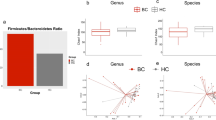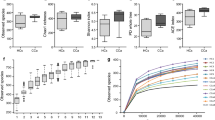Abstract
Purpose
Breast cancer (BC) is a devastating disease for women. Microbial influences may be involved in the development and progression of breast cancer. This study aimed to investigate the difference in intestinal flora abundance between breast cancer patients and healthy controls (HC) based on previous 16S ribosomal RNA (rRNA) gene sequencing results, which have been scattered and inconsistent in previous studies.
Materials and methods
In agreement with the Preferred Reporting Items for Systematic Reviews and Meta-Analyses (PRISMA), we searched for pertinent literature in Pubmed, Embase, Cochrane Library, and Web of Science databases from build until February 1, 2023. Relative abundance, diversity of intestinal microflora by level, microbial composition, community structure, diversity index, and other related data were extracted. We used a fixed or random effects model for data analysis. We also conducted funnel plot analysis, sensitivity analysis, Egger's, and Begg’s tests to assess the bias risk.
Results
A total of ten studies involving 734 BC patients were enrolled. It was pointed out that there were significant differences in the Chao index between BC and HC in these studies [SMD = − 175.44 (95% CI − 246.50 to − 104.39)]. The relative abundance of Prevotellaceae [SMD = − 0.27 (95% CI − 0.39 to − 0.15)] and Bacteroides [SMD = 0.36 (95% CI 0.23–0.49)] was significantly different. In the included articles, the relative abundance of Prevotellaceae, Ruminococcus, Roseburia inulinivorans, and Faecalibacterium prausnitzii decreased in BC. Accordingly, the relative richness of Erysipelotrichaceae was high in BC.
Conclusions
This observational meta-analysis revealed that the changes in gut microbiota were correlated with BC, and the changes in some primary fecal microbiota might affect the beginning of breast cancer.







Similar content being viewed by others
Availability of data and material
Not applicable.
References
Akram M, Iqbal M, Daniyal M, Khan AU. Awareness and current knowledge of breast cancer. Biol Res. 2017;50(1):33.
Trapani D, Ginsburg O, Fadelu T, Lin NU, Hassett M, Ilbawi AM, et al. Global challenges and policy solutions in breast cancer control. Cancer Treat Rev. 2022;104:102339.
Ginsburg O, Bray F, Coleman MP, Vanderpuye V, Eniu A, Kotha SR, et al. The global burden of women’s cancers: a grand challenge in global health. Lancet. 2017;389(10071):847–60.
Lei S, Zheng R, Zhang S, Wang S, Chen R, Sun K, et al. Global patterns of breast cancer incidence and mortality: a population-based cancer registry data analysis from 2000 to 2020. Cancer Commun (Lond). 2021;41(11):1183–94.
Gray JM, Rasanayagam S, Engel C, Rizzo J. State of the evidence 2017: an update on the connection between breast cancer and the environment. Environ Health. 2017;16(1):94.
Sun Y-S, Zhao Z, Yang Z-N, Xu F, Lu H-J, Zhu Z-Y, et al. Risk factors and preventions of breast cancer. Int J Biol Sci. 2017;13(11):1387–97.
Plottel CS, Blaser MJ. Microbiome and malignancy. Cell Host Microbe. 2011;10(4):324–35.
Siddiqui R, Makhlouf Z, Alharbi AM, Alfahemi H, Khan NA. The gut microbiome and female health. Biology (Basel). 2022;11(11):1683.
Lasagna A, Zuccaro V, Ferraris E, Corbella M, Bruno R, Pedrazzoli P. Covid-19 and breast cancer: may the microbiome be the issue? Future Oncol. 2021;17(2):123–6.
Fernández MF, Reina-Pérez I, Astorga JM, Rodríguez-Carrillo A, Plaza-Díaz J, Fontana L. Breast cancer and its relationship with the microbiota. Int J Environ Res Public Health. 2018;15(8):1747.
Laborda-Illanes A, Sanchez-Alcoholado L, Dominguez-Recio ME, Jimenez-Rodriguez B, Lavado R, Comino-Méndez I, et al. Breast and gut microbiota action mechanisms in breast cancer pathogenesis and treatment. Cancers. 2020;12(9):2465.
Komorowski AS, Pezo RC. Untapped “-omics”: the microbial metagenome, estrobolome, and their influence on the development of breast cancer and response to treatment. Breast Cancer Res Treat. 2020;179(2):287–300.
Goedert JJ, Hua X, Bielecka A, Okayasu I, Milne GL, Jones GS, et al. Postmenopausal breast cancer and oestrogen associations with the IgA-coated and IgA-noncoated faecal microbiota. Br J Cancer. 2018;118(4):471–9.
Jackson MA, Verdi S, Maxan M-E, Shin CM, Zierer J, Bowyer RCE, et al. Gut microbiota associations with common diseases and prescription medications in a population-based cohort. Nat Commun. 2018;9(1):2655.
Zhu J, Liao M, Yao Z, Liang W, Li Q, Liu J, et al. Breast cancer in postmenopausal women is associated with an altered gut metagenome. Microbiome. 2018;6(1):136.
Watts GS, Youens-Clark K, Slepian MJ, Wolk DM, Oshiro MM, Metzger GS, et al. 16s rrna gene sequencing on a benchtop sequencer: accuracy for identification of clinically important bacteria. J Appl Microbiol. 2017;123(6):1584–96.
Gao B, Chi L, Zhu Y, Shi X, Tu P, Li B, et al. An introduction to next generation sequencing bioinformatic analysis in gut microbiome studies. Biomolecules. 2021;11(4):961–8.
Aarnoutse R, Hillege LE, Ziemons J, De Vos-Geelen J, de Boer M, Aerts E, et al. Intestinal microbiota in postmenopausal breast cancer patients and controls. Cancers. 2021;13(24):6200.
Goedert JJ, Jones G, Hua X, Xu X, Yu G, Flores R, et al. Investigation of the association between the fecal microbiota and breast cancer in postmenopausal women: a population-based case-control pilot study. J Natl Cancer Inst. 2015;107(8):djv147
Shrode RL, Knobbe JE, Cady N, Yadav M, Hoang J, Cherwin C, et al. Breast cancer patients from the midwest region of the united states have reduced levels of short-chain fatty acid-producing gut bacteria. Sci Rep. 2023;13(1):526.
Caleça T, Ribeiro P, Vitorino M, Menezes M, Sampaio-Alves M, Mendes AD, et al. Breast cancer survivors and healthy women: could gut microbiota make a difference?-“biotacancersurvivors”: a case–control study. Cancers. 2023;15(3):594.
Page MJ, McKenzie JE, Bossuyt PM, Boutron I, Hoffmann TC, Mulrow CD, et al. The PRISMA 2020 statement: an updated guideline for reporting systematic reviews. BMJ. 2021;372:n71.
Atkins D, Fink K, Slutsky J. Better information for better health care: the evidence-based practice center program and the agency for healthcare research and quality. Ann Intern Med. 2005;142(12 Pt 2):1035–41.
Bobin-Dubigeon C, Luu HT, Leuillet S, Lavergne SN, Carton T, Le Vacon F, et al. Faecal microbiota composition varies between patients with breast cancer and healthy women: a comparative case-control study. Nutrients. 2021;13(8):2705.
Byrd DA, Vogtmann E, Wu Z, Han Y, Wan Y, Clegg-Lamptey JN, et al. Associations of fecal microbial profiles with breast cancer and nonmalignant breast disease in the Ghana Breast Health Study. Int J Cancer. 2021;148(11):2712–23.
He C, Liu Y, Ye SD, Yin SW, Gu JF. Changes of intestinal microflora of breast cancer in premenopausal women. Eur J Clin Microbiol Infect Dis. 2021;40(3):503–13.
Ma Z, Qu M, Wang X. Analysis of gut microbiota in patients with breast cancer and benign breast lesions. Pol J Microbiol. 2022;71(2):217–26.
Wenhui Y, Zhongyu X, Kai C, Zhaopeng C, Jinteng L, Mengjun M, et al. Variations in the gut microbiota in breast cancer occurrence and bone metastasis. Front Microbiol. 2022;13:894283.
Whittaker RH, Damschen EI, Harrison S. Plant community data collected by Robert H. Whittaker in the Siskiyou Mountains, Oregon and California, USA. Ecology. 2022;103(9):e3764.
Sonnenburg JL, Bäckhed F. Diet–microbiota interactions as moderators of human metabolism. Nature. 2016;535(7610):56–64.
Thu MS, Chotirosniramit K, Nopsopon T, Hirankarn N, Pongpirul K. Human gut, breast, and oral microbiome in breast cancer: a systematic review and meta-analysis. Front Oncol. 2023;13:1144021.
Di Modica M, Gargari G, Regondi V, Bonizzi A, Arioli S, Belmonte B, et al. Gut microbiota condition the therapeutic efficacy of trastuzumab in HER2-positive breast cancer. Can Res. 2021;81(8):2195–206.
Terrisse S, Derosa L, Iebba V, Ghiringhelli F, Vaz-Luis I, Kroemer G, et al. Intestinal microbiota influences clinical outcome and side effects of early breast cancer treatment. Cell Death Differ. 2021;28(9):2778–96.
Wang H, Altemus J, Niazi F, Green H, Calhoun BC, Sturgis C, et al. Breast tissue, oral and urinary microbiomes in breast cancer. Oncotarget. 2017;8(50):88122–38.
Garrett WS. Cancer and the microbiota. Science. 2015;348(6230):80–6.
Mirzaei R, Afaghi A, Babakhani S, Sohrabi MR, Hosseini-Fard SR, Babolhavaeji K, et al. Role of microbiota-derived short-chain fatty acids in cancer development and prevention. Biomed Pharmacother. 2021;139:111619.
González-Bosch C, Boorman E, Zunszain PA, Mann GE. Short-chain fatty acids as modulators of redox signaling in health and disease. Redox Biol. 2021;47:102165.
Cong J, Zhou P, Zhang R. Intestinal microbiota-derived short chain fatty acids in host health and disease. Nutrients. 2022;14(9):1977.
He J, Zhang P, Shen L, Niu L, Tan Y, Chen L, et al. Short-chain fatty acids and their association with signalling pathways in inflammation, glucose and lipid metabolism. Int J Mol Sci. 2020;21(17):6356.
Portincasa P, Bonfrate L, Vacca M, De Angelis M, Farella I, Lanza E, et al. Gut microbiota and short chain fatty acids: implications in glucose homeostasis. Int J Mol Sci. 2022;23(3):1105.
Xie Q-S, Zhang J-X, Liu M, Liu P-H, Wang Z-J, Zhu L, et al. Short-chain fatty acids exert opposite effects on the expression and function of p-glycoprotein and breast cancer resistance protein in rat intestine. Acta Pharmacol Sin. 2021;42(3):470–81.
Lennicke C, Cochemé HM. Redox metabolism: ROS as specific molecular regulators of cell signaling and function. Mol Cell. 2021;81(18):3691–707.
González-Bosch C, Zunszain PA, Mann GE. Control of redox homeostasis by short-chain fatty acids: implications for the prevention and treatment of breast cancer. Pathogens. 2023;12(3):486.
Dieleman S, Aarnoutse R, Ziemons J, Kooreman L, Boleij A, Smidt M. Exploring the potential of breast microbiota as biomarker for breast cancer and therapeutic response. Am J Pathol. 2021;191(6):968–82.
Parida S, Sharma D. The microbiome–estrogen connection and breast cancer risk. Cells. 2019;8(12):1642.
Funding
The National Natural Science Foundations of China provided support for this article (Grant nos. 82060543 and 82060538).
Author information
Authors and Affiliations
Contributions
BQL and FG: Conceptualization, Methodology, Software, Writing—Original draft preparation. ZQL and XJL: Revision of thesis writing, Organize data, Discuss the results. XJL, and LC: Data extraction. HZ, JXW, ZQL and QZY: Software, Validation. WLC: Writing—Reviewing and Editing. All authors did literature research. All authors contributed to the article and endorsed the submitted version.
Corresponding author
Ethics declarations
Conflict of interest
The authors declare that they have no known competing financial interests or personal relationships that could have appeared to influence the work reported in this paper.
Ethical approval
This article does not include any studies with human participants or animals performed by any of the authors.
Informed consent
This is a systematic review and meta-analysis article that does not need informed consent or any ethical approvals in its current form.
Additional information
Publisher's Note
Springer Nature remains neutral with regard to jurisdictional claims in published maps and institutional affiliations.
Supplementary Information
Below is the link to the electronic supplementary material.
Rights and permissions
Springer Nature or its licensor (e.g. a society or other partner) holds exclusive rights to this article under a publishing agreement with the author(s) or other rightsholder(s); author self-archiving of the accepted manuscript version of this article is solely governed by the terms of such publishing agreement and applicable law.
About this article
Cite this article
Luan, B., Ge, F., Lu, X. et al. Changes in the fecal microbiota of breast cancer patients based on 16S rRNA gene sequencing: a systematic review and meta-analysis. Clin Transl Oncol (2024). https://doi.org/10.1007/s12094-023-03373-5
Received:
Accepted:
Published:
DOI: https://doi.org/10.1007/s12094-023-03373-5




